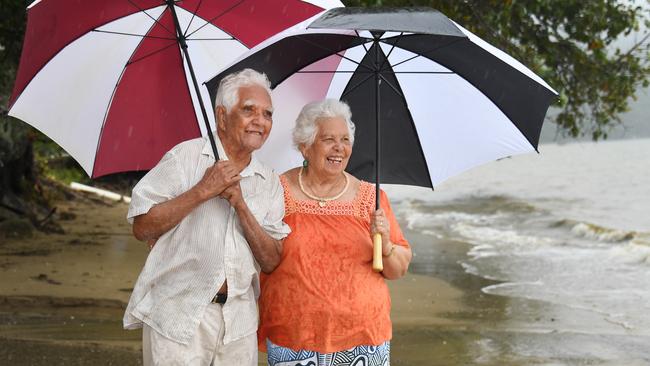Tree fed roots of protest league
Ruth Hennings and Alfred Neal plotted the protest movement that helped bring equality for Aboriginal Australians.

More than 50 years ago, Ruth Hennings sat with Alfred Neal day after day under the “Tree of Knowledge” in Yarrabah, near Cairns, plotting the protest movement across Queensland’s conservative north that helped bring the beginnings of equality for Aboriginal Australians.
It was from there that the mission-raised pair led the local Aboriginal and Torres Strait Islander Advancement League, in its struggle to win support for the successful 1967 referendum, enabling laws for indigenous people and including them in the census.
The only survivors of the league, Ms Hennings, 85, and Mr Neal, 94, reunited yesterday on the beach near where the tree stood after learning they — had been awarded Order of Australia Medals for services to the indigenous community.
“We’d always meet there (beneath the tree) and talk about the problems and things that were happening to our people,” she told The Weekend Australian. “We are the only two left from the Aboriginal advancement league (in Cairns).”
Ms Hennings, previously known as Ruth Wallace from her first marriage, said it brought tears to her eyes to be recognised with an OAM alongside her friend “Alfie”.
“It’ll be good for me and him to stand together,” she said. “It’s nice to be recognised at our age now.
“We both grew up in missions and know how hard it was. Everything we did was to help our people and we both believe in justice.”
The pair were among seven people across Australia who fought for the 1967 referendum to be awarded Order of Australia honours today.
Other recipients were Dulcie Flower, Kathleen Mills, Pamela Pedersen, Albert Pittock and Diana Travis.
Ms Hennings said that while there had been some positive changes since the 1967 referendum, which was 90 per cent in favour, Aboriginal and Torres Strait Islander people were still left behind in many areas.
“Things have changed since — we are having more opportunities like education and housing and health,” she said.
“A lot of our kids have been educated and are getting a degree.
“There’s still things do be done in employment, education and legal justice.”
Ms Hennings said she wanted indigenous people to be recognised as first inhabitants in the Constitution, which after 1967 removed passages excluding them but did not specifically include them.
“While we are not on the Constitution, like we should be, we are not happy,” she said.
Mr Neal told The Weekend Australian he was glad to be recognised for his work in the referendum campaign and in Yarrabah but said there was still a lot of work that needed to be done to bridge the gap between indigenous and non-indigenous Australians and to improve relations.
“There is a big difference there,” he said.
“White people should respect Aboriginal culture, but we should be respecting their culture too.”




